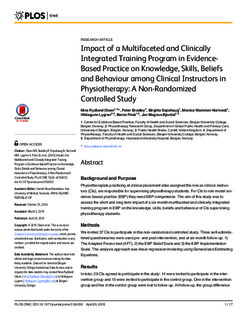| dc.description.abstract | Background and Purpose Physiotherapists practicing at clinical placement sites assigned the role as clinical instructors (CIs), are responsible for supervising physiotherapy students. For CIs to role model evidence-based practice (EBP) they need EBP competence. The aim of this study was to assess the short and long term impact of a six-month multifaceted and clinically integrated training program in EBP on the knowledge, skills, beliefs and behaviour of CIs supervising physiotherapy students. Methods We invited 37 CIs to participate in this non-randomized controlled study. Three self-administered questionnaires were used pre- and post-intervention, and at six-month follow-up: 1) The Adapted Fresno test (AFT), 2) the EBP Belief Scale and 3) the EBP Implementation Scale. The analysis approach was linear regression modeling using Generalized Estimating Equations. Results In total, 29 CIs agreed to participate in the study: 14 were invited to participate in the intervention group and 15 were invited to participate in the control group. One in the intervention group and five in the control group were lost to follow-up. At follow-up, the group difference Background and Purpose Physiotherapists practicing at clinical placement sites assigned the role as clinical instructors (CIs), are responsible for supervising physiotherapy students. For CIs to role model evidence-based practice (EBP) they need EBP competence. The aim of this study was to assess the short and long term impact of a six-month multifaceted and clinically integrated training program in EBP on the knowledge, skills, beliefs and behaviour of CIs supervising physiotherapy students. Methods We invited 37 CIs to participate in this non-randomized controlled study. Three self-administered questionnaires were used pre- and post-intervention, and at six-month follow-up: 1) The Adapted Fresno test (AFT), 2) the EBP Belief Scale and 3) the EBP Implementation Scale. The analysis approach was linear regression modeling using Generalized Estimating Equations. Results In total, 29 CIs agreed to participate in the study: 14 were invited to participate in the intervention group and 15 were invited to participate in the control group. One in the intervention group and five in the control group were lost to follow-up. At follow-up, the group difference Background and Purpose Physiotherapists practicing at clinical placement sites assigned the role as clinical instructors (CIs), are responsible for supervising physiotherapy students. For CIs to role model evidence-based practice (EBP) they need EBP competence. The aim of this study was to assess the short and long term impact of a six-month multifaceted and clinically integrated training program in EBP on the knowledge, skills, beliefs and behaviour of CIs supervising physiotherapy students. Methods We invited 37 CIs to participate in this non-randomized controlled study. Three self-administered questionnaires were used pre- and post-intervention, and at six-month follow-up: 1) The Adapted Fresno test (AFT), 2) the EBP Belief Scale and 3) the EBP Implementation Scale. The analysis approach was linear regression modeling using Generalized Estimating Equations. Results In total, 29 CIs agreed to participate in the study: 14 were invited to participate in the intervention group and 15 were invited to participate in the control group. One in the intervention group and five in the control group were lost to follow-up. At follow-up, the group difference was statistically significant for the AFT (mean difference = 37, 95% CI (15.9 -58.1), p<0.001) and the EBP Beliefs scale (mean difference = 8.1, 95% CI (3.1 -13.2), p = 0.002), but not for the EBP Implementation scale (mean difference = 1.8. 95% CI (-4.5-8.1), p = 0.574). Comparing measurements over time, we found a statistically significant increase in mean scores related to all outcome measures for the intervention group only. Conclusions A multifaceted and clinically integrated training program in EBP was successful in improving EBP knowledge, skills and beliefs among CIs. Future studies need to ensure long-term EBP behaviour change, in addition to assessing CIs’ abilities to apply EBP knowledge and skills when supervising students. | en_GB |

